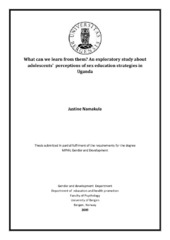What can we learn from them? An exploratory study of adolescents' perceptions of sex education strategies in Uganda
Master thesis
Permanent lenke
https://hdl.handle.net/1956/3472Utgivelsesdato
2009-05-14Metadata
Vis full innførselSamlinger
- Faculty of Psychology [527]
Sammendrag
This study aimed at exploring the lessons we can learn from adolescents' perceptions on sex education strategies in Uganda. This study was guided by the social learning theory. Methods: This was a qualitative study based on purposive sampling. In depth interviews were conducted with 23 boys and girls aged 15-19 years, in Kampala and Kiboga districts, who were either in-school or out of school. The interviews were recorded, transcribed and analysed. Results: Research findings indicated that there is more to sex education than HIV/AIDS prevention. Another major finding was that adolescents are exposed to a variety of sources of sex education. The paternal Aunt as a source was mentioned the least, implying that adolescents did not attach as much importance to it as was attached traditionally. However, the media had a lot of influence on adolescent' sexual behaviour since it was the most mentioned source. Another finding was that there is a relationship between what adults say and adolescents would like to know. Adults say what should/can be done' while adolescents ask how?'. The study also revealed that adolescents tend to have different needs and these needs require different messages. Adolescents also evaluate messages differently. There were factors that influenced which person adolescents turn to when they have questions related to sexuality. These included trust, openness, gender, knowlegeability, proximity and age. Conclusion: We can learn a lot from adolescents' perceptions, experiences and reflections if adolescents are given a chance to express their views. However, the issue of trust is important as it creates a favourable environment for openness in communication about sex and sexuality.
Utgiver
The University of BergenOpphavsrett
Copyright the author. All rights reservedThe author
